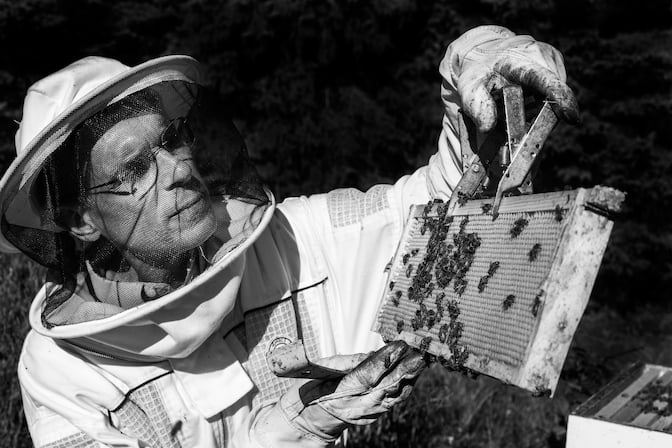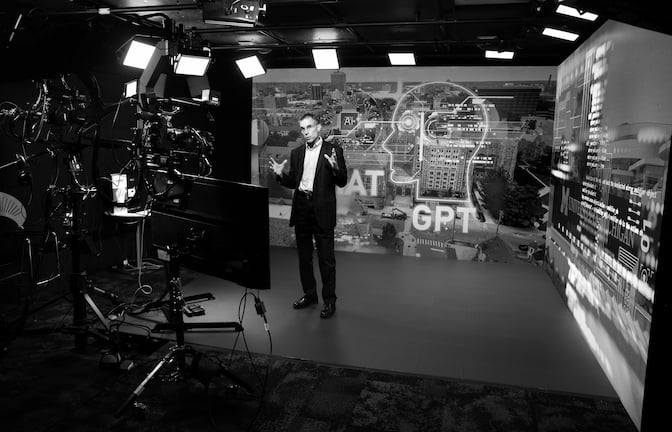
Advancing engineering principles in manufacturing and supply chains
NAE profile: Wallace J. Hopp, business and engineering leader and author

NAE profile: Wallace J. Hopp, business and engineering leader and author
Get to know Michigan Engineering’s National Academy of Engineering members.
For creating and applying fundamental engineering principles governing the underlying behavior of manufacturing systems and supply chains. Wallace J. Hopp was elected to the National Academy of Engineering in 2014. View the NAE citation.
Beyond academia, Hopp has been an active industry consultant for clients like Abbott Laboratories, Boeing, Dell, Ford, General Motors, IBM, Intel, Motorola, Whirlpool, and many others.
More on Wallace Hopp

Hopp: I grew up in a town called Mason, Michigan, which is near Lansing, and it was a farm town. I wasn’t in town. I was out in the farms, working in the farms when I was a kid—picking up stones out of fields and baling hay and things like that. It was great. It was a wonderful place to grow up. I went to college at Michigan State, which is the college right down the road from us. I didn’t know about things like engineering and so forth at that point. I went and majored in physics when I was an undergrad and had a great time.
Even when I was doing physics and even when I’m doing business, I think about the world like an engineer. I think I’m an engineer at heart. I started out in science and wound up in business, but I think I’ve always been an engineer. So meaning that I think of it mechanistically and I use models and math to describe it.
Hopp: I paired up with a guy named Mark Spearman, who was also a physicist. We had this kind of connection that our backgrounds are both in physics and we were working on manufacturing. By this time, the Japanese manufacturing revolution had hit and Toyota was this threatening behemoth and people were starting to worry about Toyota sort of supplanting U.S. manufacturing. So he and I kind of backed up and started asking, well, what drives the efficiency of these production systems? Why does Toyota’s system work in Toyota and not work at all anywhere else?
What we did is we boiled down the essence of the Japanese manufacturing techniques into some principles that were far more generalizable. And we wound up writing a book called Factory Physics. That was a big hit. It wound up being used in some 200 universities in North America as a text and turned into a term. So factory physics kind of became a thing. And lots of people use that term now.
We also came up with another term called constant work in process which was sort of a generalization of the just-in-time technique that Toyota was doing that allowed companies with high product mix to still get the benefits of the efficiency that Toyota had without having to have all the restrictions and the small number of parts that Toyota had. That was influential not only in research circles where people have studied and cited our books and papers thousands of times, but also as something that actually has been implemented in practice.
Hopp: I had a dean at Northwestern who said that engineering is the liberal arts of the 21st century. If you want to be a well-rounded person that can manage businesses, can innovate, and can function well in society, that engineering is the background. Once upon a time it was only liberal arts. But now, given the technological dependance of society, you really need to understand technology, and engineers are the people that understand technology and its use in the world. I think part of the reason that I was able to morph myself all the way from physics into business is because the engineering mindset lends itself well to all of those things.
My advice would be to learn your fundamentals now, but be ready to change because the world that you’re coming into is going to change a lot. If I look at how my world changed, I started teaching with a box of chalk and wound up using machine learning and video production. It’s just night and day. There was no email, there were no cell phones, none of that when I started my professional career. None of it existed or had even the potential to exist. My guess is that for the people that are starting their careers now the amount of change will be even greater.
Hopp: Losing my life partner. That’s the worst thing that I dealt with, and that changes everything but has nothing to do with my career. Birth or death, that’s the most important stuff in life. My wife died, and a couple of years later my daughter had a son. So I’m now a grandparent, and there’s no deeper sorrow than losing the most important person in your life. But there’s no greater joy than having a happy little grandson.
I like the fact that the students that I talk to nowadays are very conscious of not just focusing on a career, but focusing on a life. And so they talk a lot about purpose. I think that’s the right way to think about life. If you think about career by itself, I think that’s incomplete because your career is part of your life and your life as part of your career. I think it’s valid and important to combine the two and leave it that way.
Hopp: Fundamentally, I believe that the human condition is about collaboration, that as we evolve, we work collectively better. If you look at all of our systems, whether it’s religion, politics, economics, etc, there are all these mechanisms that are basically set up to help human beings work together productively because individually we’re kind of weak and stupid, but collectively we’re very intelligent and very strong. So I have collaborated with so many people in my research, and that has been one of the great joys of this career. It’s been able to to work on things that I never could have done on my own, but only by putting people together.
Quotes edited from interview transcript between Wallace Hopp and Marcin Szczepanski.